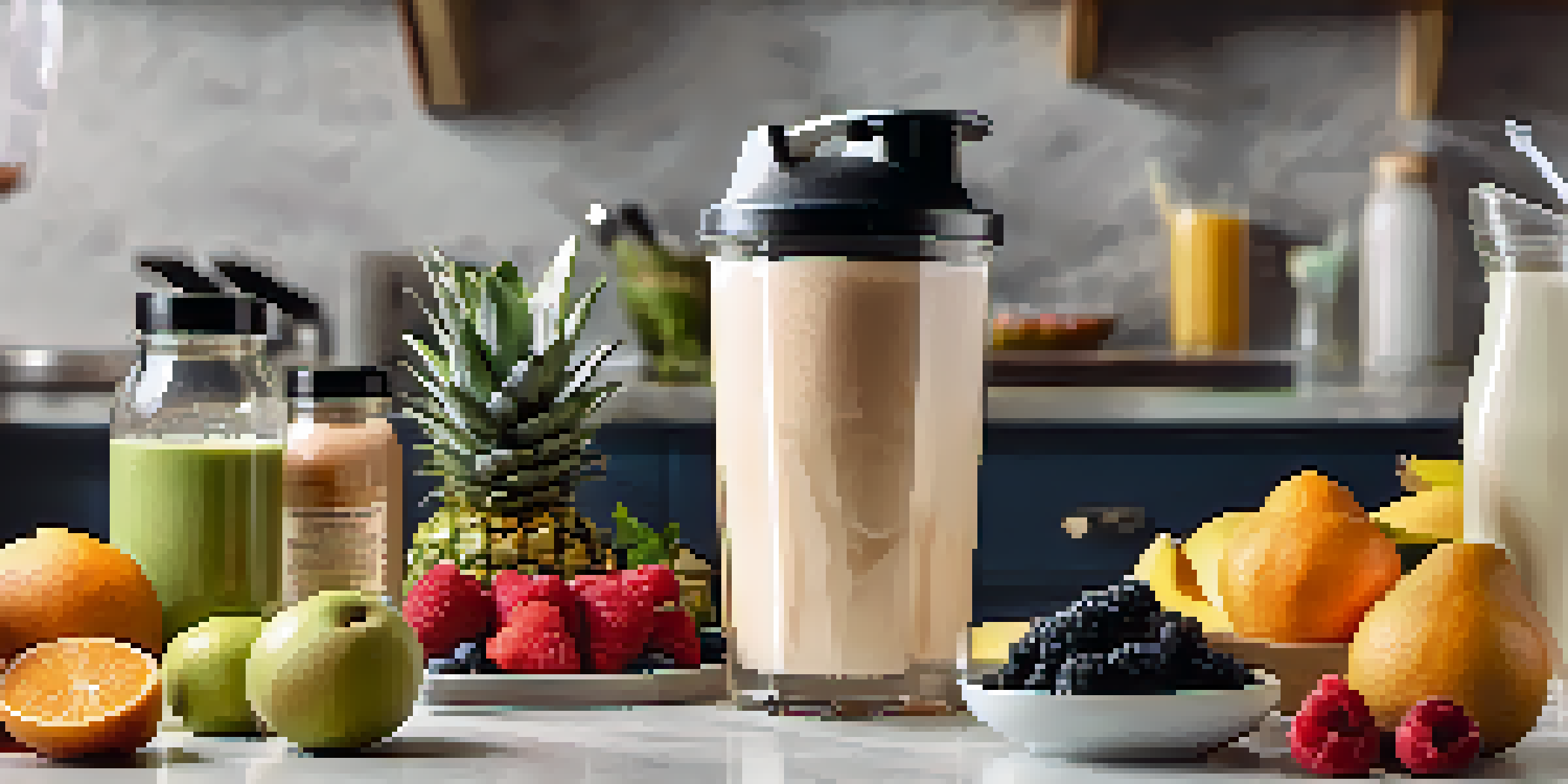Bodybuilding Supplements: Are They Necessary?

Understanding Bodybuilding Supplements and Their Purpose
Bodybuilding supplements are products designed to enhance muscle growth, recovery, and performance. They come in various forms, including powders, pills, and bars, making them convenient for athletes. Many people wonder if these supplements are essential for achieving fitness goals or if they can rely solely on food.
Supplements are not the answer to a poor diet; they are meant to enhance a well-rounded approach to nutrition and fitness.
The primary purpose of these supplements is to provide nutrients that may be missing from your diet. For instance, protein powders can help ensure you get enough protein to support muscle repair and growth. However, it’s important to understand that supplements should complement, not replace, a balanced diet.
While supplements can be beneficial, they are not a magic solution. A well-rounded approach that includes proper nutrition and training is crucial for success in bodybuilding. So, before diving into the world of supplements, it’s vital to evaluate your dietary habits and fitness goals.
The Role of Protein in Muscle Building
Protein is often dubbed the cornerstone of muscle growth, and for good reason. When you work out, you create tiny tears in your muscle fibers, and protein helps repair and build them back stronger. While whole food sources like chicken, fish, and legumes are excellent options, some find it hard to meet their protein needs through food alone.

This is where protein supplements, such as whey or plant-based powders, come into play. They offer a convenient way to boost protein intake without the need for extensive meal prep. For example, a quick protein shake after a workout can help jumpstart recovery, especially when time is tight.
Supplements Complement Diet
Bodybuilding supplements are meant to enhance muscle growth and recovery but should not replace a balanced diet.
However, relying solely on protein supplements is not advisable. Whole foods provide a variety of nutrients that your body needs for overall health. It's best to use supplements as a tool to fill in the gaps rather than the primary source of your nutrition.
Pre-Workout Supplements: Do They Work?
Pre-workout supplements are designed to enhance energy and focus during workouts. They typically contain ingredients like caffeine, beta-alanine, and creatine, each claiming to improve performance. Many athletes swear by them, but do they really make a difference?
Good nutrition is a crucial part of a healthy lifestyle. Supplements can help fill gaps, but whole foods should always come first.
Caffeine, for instance, is a well-researched ingredient known to boost energy and endurance. It can help you push through tough workouts, making it a popular choice among bodybuilders. However, the effectiveness varies from person to person, and some might experience side effects like jitters or an upset stomach.
Ultimately, whether you need a pre-workout supplement depends on your individual goals and tolerance. If you find that you can perform well without it, you might not need to incorporate one into your routine. Listening to your body and experimenting can help you determine what works best for you.
Creatine: The Most Studied Supplement
Creatine is one of the most researched supplements in the fitness industry, known for its ability to enhance strength and muscle mass. It works by replenishing your body’s energy stores during high-intensity activities, allowing for better performance and quicker recovery. Many athletes consider it a staple in their supplement regimen.
While creatine is effective, it’s crucial to understand how to use it properly. Most people benefit from a loading phase, followed by a maintenance phase, to maximize its effects. It's generally safe for most, but anyone with health concerns should consult a healthcare professional before starting.
Protein is Key for Muscle Growth
Protein is essential for muscle repair and growth, and while supplements can help, whole food sources are vital for overall health.
Incorporating creatine into your routine can lead to noticeable improvements, but remember that it's not a substitute for hard work and dedication. A solid training program and healthy diet should remain your top priorities, with creatine serving as a helpful addition.
The Importance of Vitamins and Minerals
While protein and creatine often steal the spotlight, vitamins and minerals play a crucial role in overall health and performance. These micronutrients support various bodily functions, including immune health and energy production. Without adequate vitamins and minerals, your body may struggle to recover from workouts or perform optimally.
Common deficiencies among bodybuilders include vitamin D, magnesium, and zinc. These nutrients can help improve muscle function and recovery, making them essential for anyone serious about their fitness journey. While whole foods should be the primary source of these nutrients, supplements can help fill the gaps if your diet falls short.
Prioritizing a varied diet rich in fruits, vegetables, and whole grains can help you meet your vitamin and mineral needs. If you're considering supplements, opt for a high-quality multivitamin to support your overall health without overdoing it on individual nutrients.
Potential Risks of Overusing Supplements
While supplements can be beneficial, overuse can lead to potential risks and side effects. Taking excessive amounts of certain supplements can strain your kidneys or liver, particularly with products high in protein or certain vitamins. It’s important to educate yourself and follow recommended dosages to avoid adverse effects.
Moreover, the supplement industry is less regulated than food, leading to concerns about purity and quality. Some products may contain undisclosed ingredients or contaminants, which could pose health risks. It’s wise to choose reputable brands and check for third-party testing to ensure safety.
Be Cautious with Supplement Use
Overusing supplements can lead to health risks, so it’s important to educate yourself and consult professionals for safe usage.
Being informed and cautious about supplement use is essential. Always consider your overall diet and lifestyle, and consult with a healthcare professional if you're unsure about what you need. Supplements should enhance your health, not jeopardize it.
Making Informed Choices About Supplements
With so many supplements on the market, making informed choices can feel overwhelming. Start by assessing your dietary habits and fitness goals. If you find that you're consistently falling short in certain areas, it might be time to consider supplements as a supportive tool.
It’s also helpful to be skeptical of marketing claims. Not all supplements deliver the promised results, and some may not be necessary at all. Research and read reviews from credible sources to determine which products have real benefits.

Ultimately, the best approach is to prioritize a balanced diet and effective training regimen. Supplements should only serve as an aid to help you achieve your fitness aspirations, not a replacement for hard work and commitment.